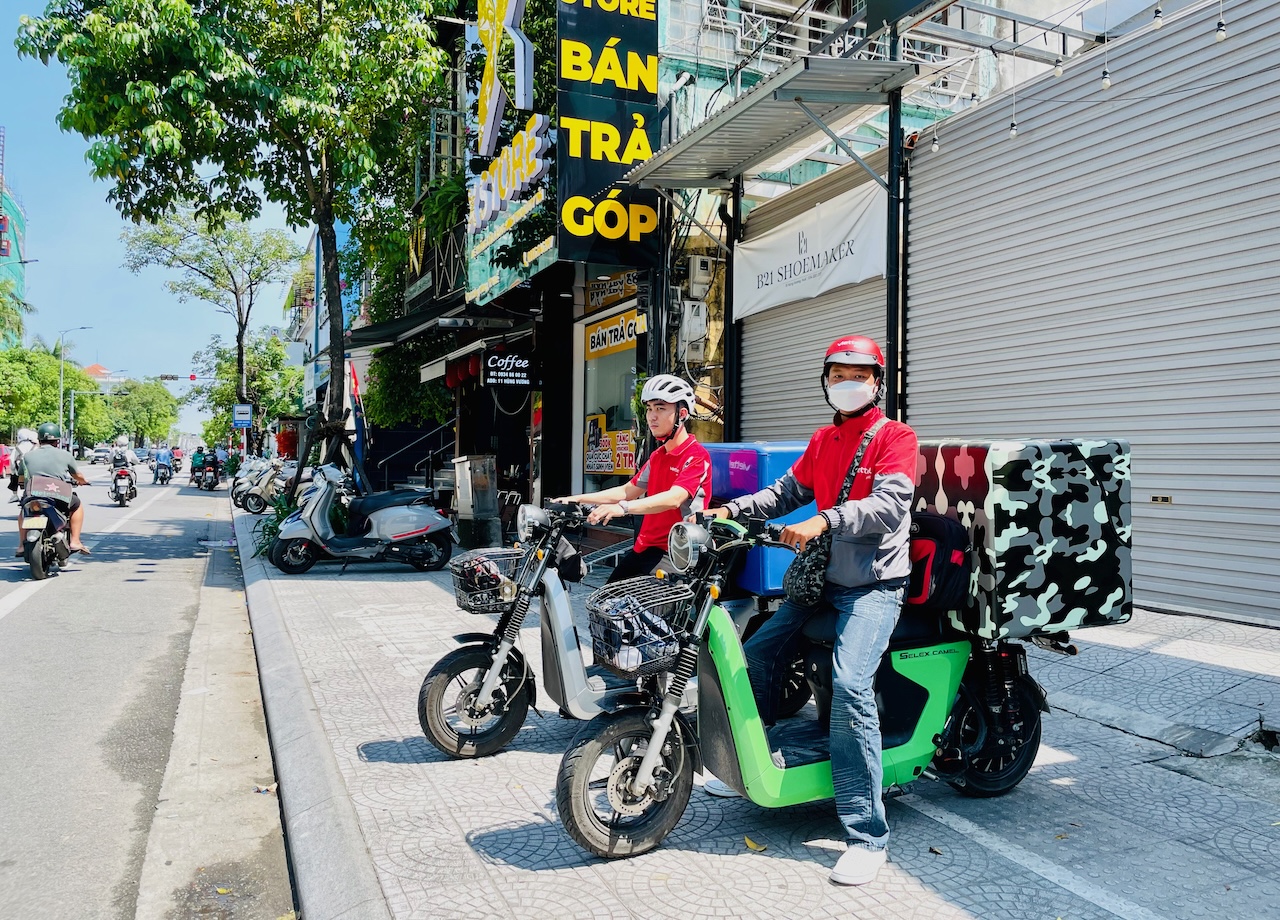
Tuan Anh and his colleague are using their new e-motorbikes for work. Photo: Phan Huong Giang / UNDP Viet Nam
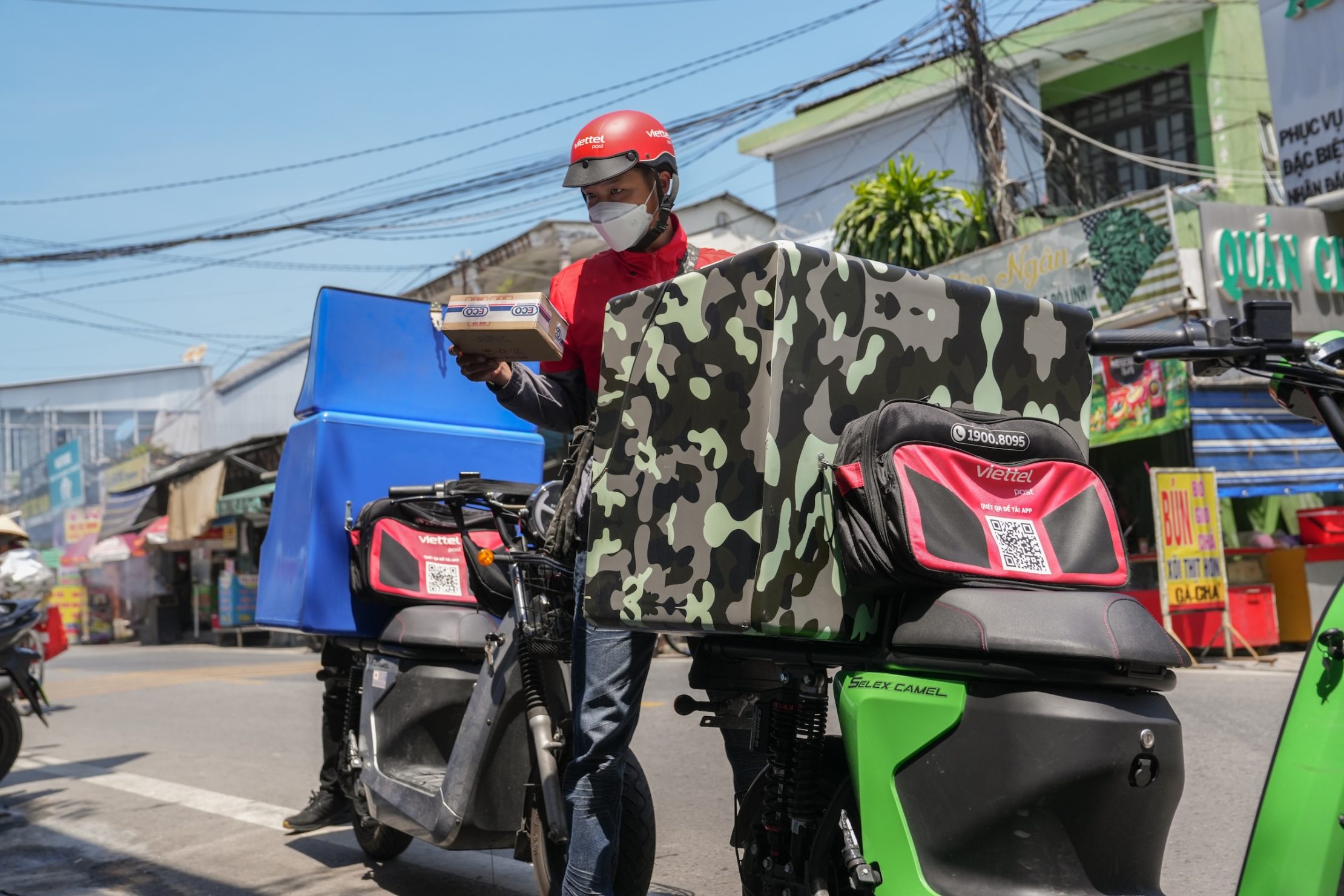
Ho Tuan Anh delivers goods with his new e-motorbike. Photo: Phan Huong Giang / UNDP Viet Nam
In the summer, Ho Tuan Anh, a shipper residing in the bustling city of Hue, traverses the streets every day on his motorbike. As he does, the scorching sun beats down on his back.
Confronted with the realities of the climate crisis all around him, he says, "The weather in Hue has become more extreme, with hotter temperatures and unpredictable rainfall. It affects our health and makes it difficult to plan our daily activities."
The increasing traffic congestion and the ever-growing emissions from gasoline-powered vehicles are additional issues plaguing the city. "The traffic density in Hue is rising, and it feels like more vehicles are on the road daily,” Tuan Anh explains. “The emissions from these vehicles contribute to air pollution and have a detrimental effect on our environment."
In Viet Nam, the transport sector accounts for 10.8 percent of the country’s total CO2 emissions. A growing population with rising transport demands means this contribution is estimated to increase by 6-7 percent annually, in a business-as-usual scenario. However, solutions can be found in electric mobility, which is among the most effective measures to promote green transportation and curb emissions.
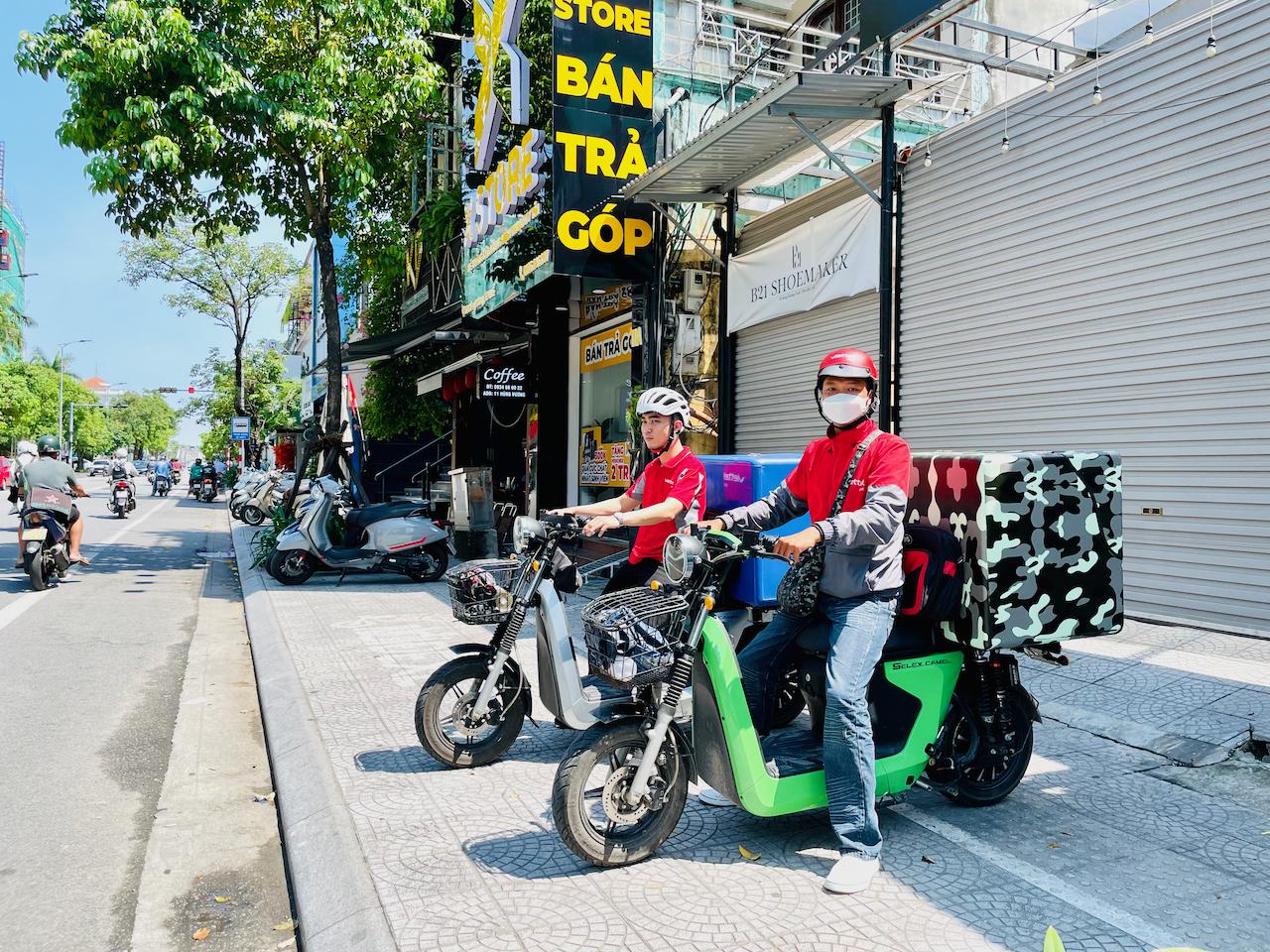
Tuan Anh and his colleague are using their new e-motorbikes for work. Photo by: Phan Huong Giang/UNDP Viet Nam
As Tuan Anh has learned more about the climate crisis, its causes and consequences, he has also discovered the benefits of electric vehicles (EVs). The prospect of reducing his carbon footprint and contributing to a cleaner environment resonated deeply with him. "Electric motorbikes provide a sustainable solution to our transportation needs. They emit zero tailpipe emissions, which means cleaner air for all of us,” he explains.
Tuan Anh decided to transition from his regular motorbike to an electric one. "Switching to an electric motorbike was a significant change for me. It not only reduces the carbon emission of my normal motorbike but also reduces the noise pollution."
He took a loan from the Women's Union with a 0 percent interest rate to buy the electric motorbike. It is the first time that the Women’s Union has implemented this loan programme, which is designed to support the purchase of EVs, encouraging women and shippers to transition from gasoline-powered modes of transport to environmentally friendly alternatives.
The Union typically works to support women members to improve their livelihood; however, to encourage widespread adoption of EVs, they have extended the eligibility of the loan programme to both women and men. The initiative was warmly welcomed by the community – 185 people have already taken loans since it launched in 2022.
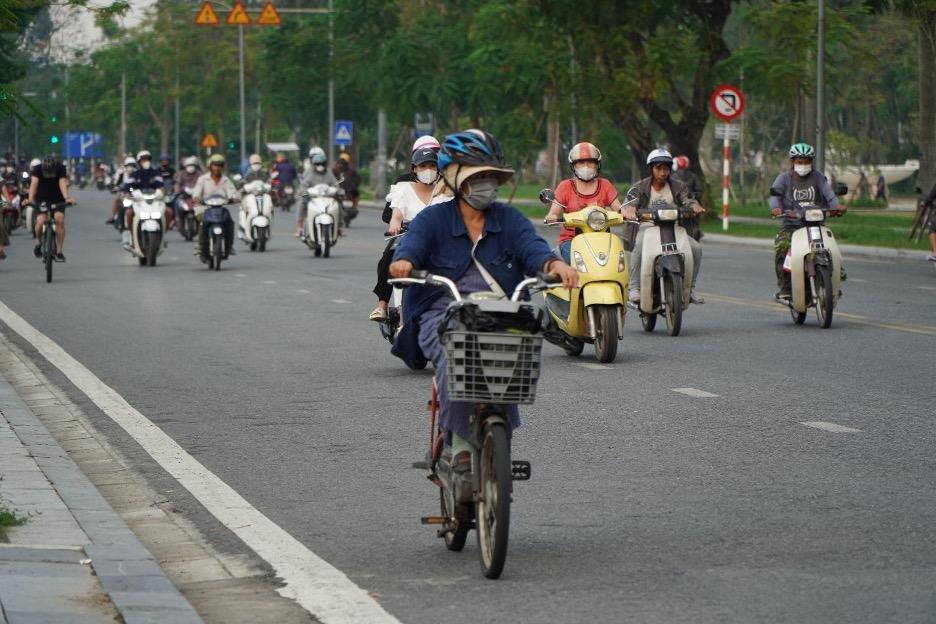
A street at rush hour in Hue city. Photo by: UNDP Viet Nam
Can Thi Le Thuy, head of the Women's Union branch in Xuan Phu township, emphasizes the importance of their initiative: "By participating in the loan programme for electric cars, we not only promote low-emission vehicles but also raise awareness of environmental protection within our community."
Thuy says that as more people continue to use gasoline-powered vehicles, harmful emissions will continue to be emitted into the environment. “If we don't change our awareness and behavior now, our city’s pollution problem will only become more severe," she adds.
A new initiative implemented by UNDP and supported by the Government of Japan aims to reduce greenhouse gas emissions by strengthening the ecosystem for e-mobility and green transport at the national level. The pilot activities in Hue City will serve as a model for other regions, promoting a comprehensive national programme on green public transport and advancing the development of the EV charging infrastructure.
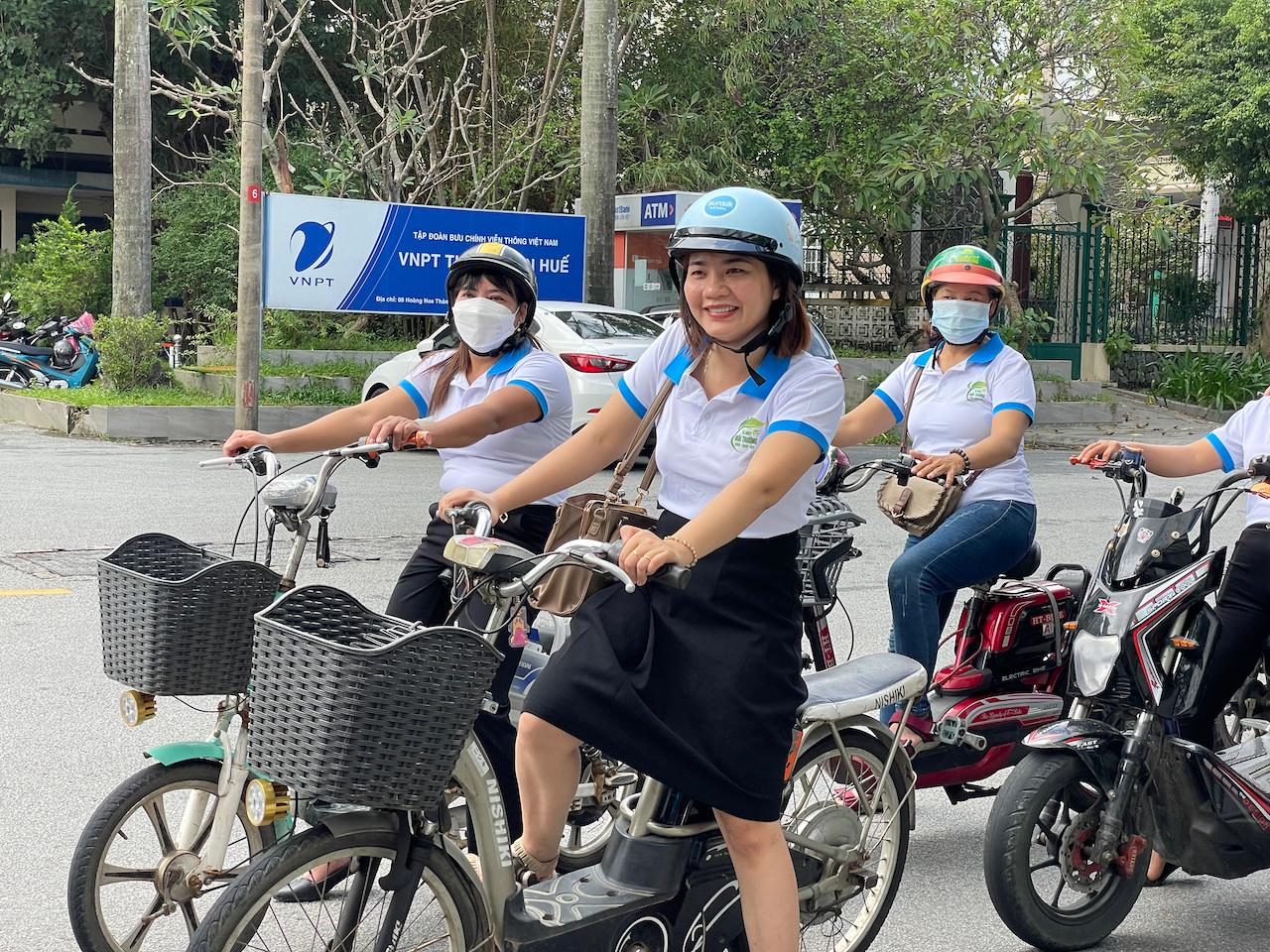
Women’s Union members use EVs daily. Photo by: Phan Huong Giang/ UNDP Viet Nam
One of the project's key accomplishments is establishing an enabling policy environment supporting green transport and e-mobility expansion. This includes the development of a national roadmap, policies, and incentives to encourage the transition to EVs, as well as implementing a preferential loan scheme to facilitate people's shift to EVs.
In its updated Nationally Determined Contribution (NDC), Viet Nam set a mitigation target to reduce emissions by 15.8 percent by 2030, and implementing these measures will be critical to reducing the transport sector’s contribution.
"We believed that through collective efforts and a shared commitment to combating the climate crisis, Hue would emerge as a shining example of an environmental city," Thuy says.
Through the concerted efforts of individuals like Ho Tuan Anh and Thuy, combined with the support and impact of the UNDP-implemented project, Hue City is emerging as a beacon of environmental stewardship and sustainable urban development. As other cities and regions in Viet Nam learn from Hue's example, the positive impact of this project will reverberate across the country, inspiring further actions to combat the climate crisis and foster a greener, cleaner, and more prosperous Viet Nam for generations to come.
Looking ahead, Tuan Anh envisions a city where EVs are the norm, and the streets are free from the noise and pollution of gasoline-powered vehicles. He believes in the power of collective action: "If more people join me in adopting EVs, we can create a significant shift towards a greener future. Together, we can build a city that prioritizes sustainability and works towards mitigating the effects of the climate crisis."

Members of the Women's Union participated in a march on electric bicycles and motorbikes, calling on people to use EVs. Photo by: Phan Huong Giang/ UNDP Viet Nam
Japan considers that the climate crisis is a threat to all humanity and, in cooperation with UNDP, leads countries to accelerate their climate action.
In 2021, UNDP launched a new phase of Climate Promise – From Pledge to Impact – aimed at translating NDC targets into concrete action. Japan is the largest supporter of this phase and joins longstanding partners such as Germany, Sweden, the European Union, Spain, and Italy and new partners such as the United Kingdom, Belgium, Iceland, and Portugal to accelerate these efforts.
Related topics |

